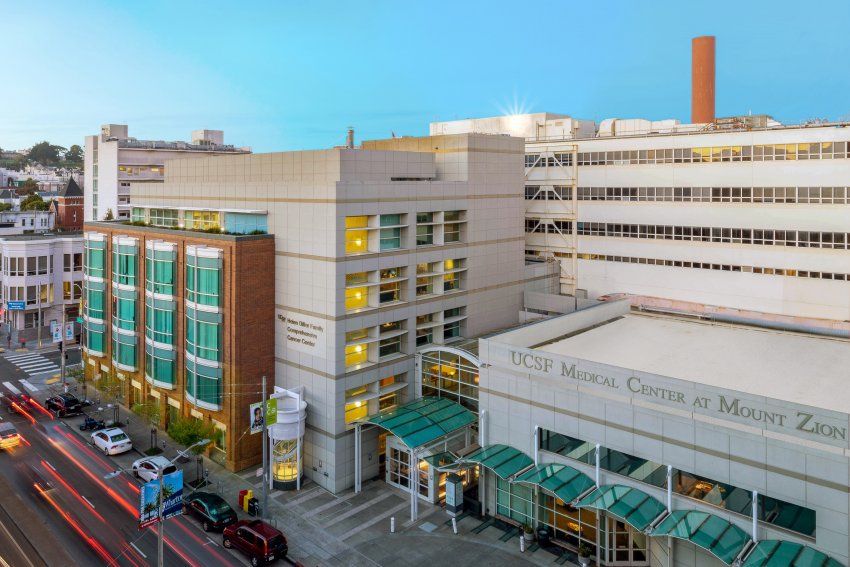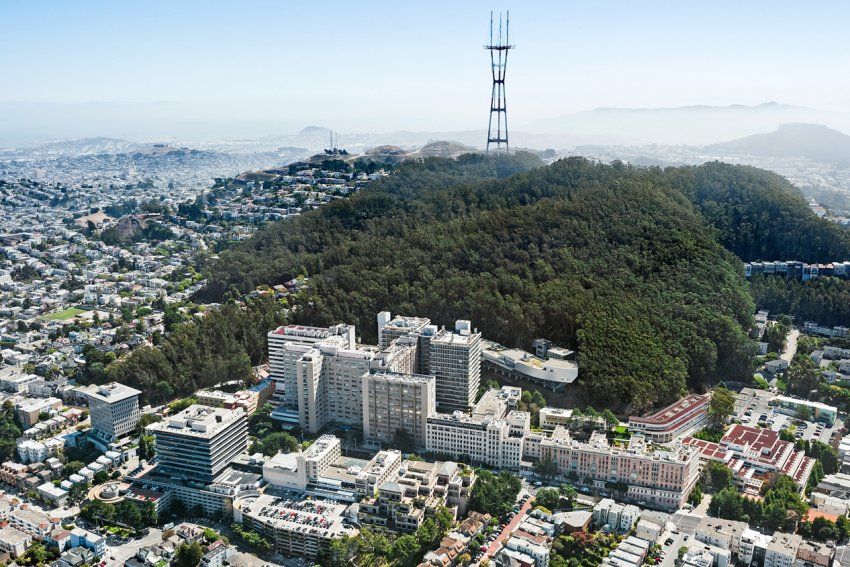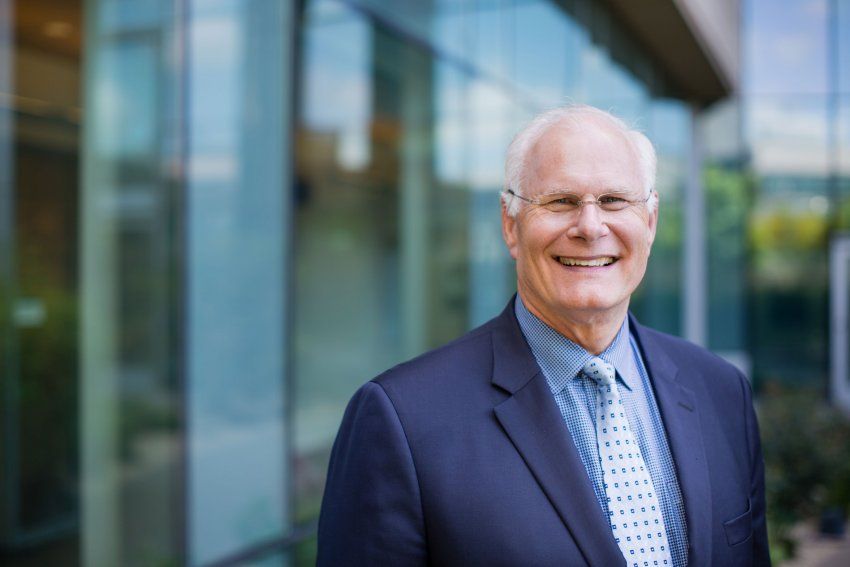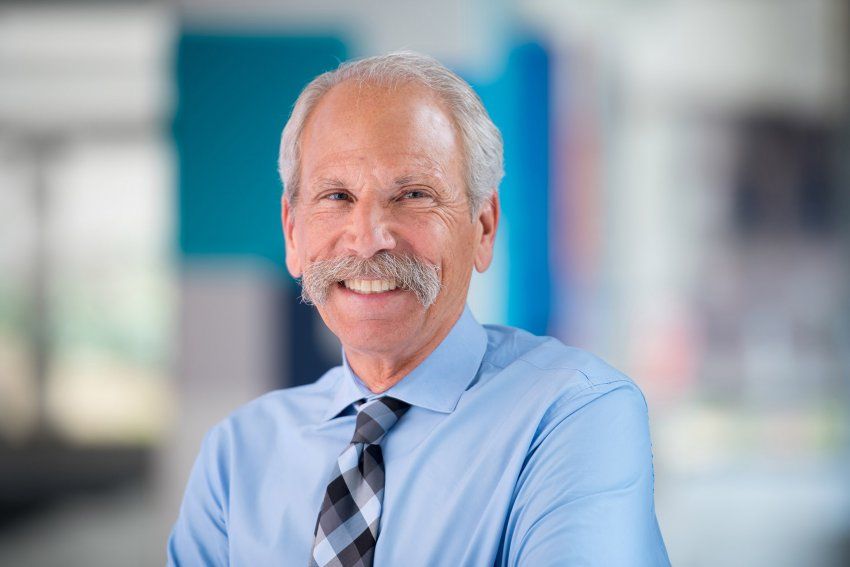Chancellor Salutes UCSF’s Unflagging Mission in 2021 State of the University Address
As UC San Francisco emerges from the worst phase of the COVID-19 pandemic, it is also growing stronger thanks to the determination and contributions of everyone across the diverse UCSF community.
In his eighth annual State of the University address, titled “Catalyst,” Chancellor Sam Hawgood, MBBS, highlighted the UCSF community’s many accomplishments despite the ongoing challenges of the past year.
“The pandemic has, indeed, been a catalyst for scientific discovery, for public health coordination at unprecedented scale, and for new models of working and learning,” Hawgood said. “But it has not changed our mission across research education, care delivery and public service.”
During the virtual show, which premiered on Oct. 21, Hawgood recounted these accomplishments in the context of the four priorities he set forth in October 2019: Innovation, Partnerships, Financial Resiliency, and People and Culture.
Although many on-campus activities were curtailed in response to public health orders, UCSF faculty, staff and learners alike pivoted to remote work where possible, adjusting to changing policies and guidelines to fulfill UCSF’s mission.
“As individuals and as an institution, we have been tested and stretched to our limits,” he said. “But in the face of adversity, we also have unleashed our potential in unanticipated ways, breaking down barriers of bureaucracy and creating new ways of working together.”
Driving Innovation
“You have collectively set the bar even higher working at the forefront of scientific discovery and care delivery, constantly redefining what’s possible in advancing health at home and abroad,” said the Chancellor.
He highlighted the Living Therapeutics Initiative, launched in June, which seeks to develop cell therapies to treat or cure diseases for patients with few current options. An early example, CAR-T-cell therapies, have already proven lifesaving for patients with certain blood cancers. The new initiative brings together UCSF’s vast scientific and clinical expertise across disparate program into one initiative to accelerate research and translation into therapies.
Among the other exciting innovations, researchers at UCSF Benioff Children’s Hospital Oakland will soon embark on the first human trial to apply CRISPR gene-editing technology in an attempt to cure sickle cell disease.
UCSF neurosurgeon Edward Chang, MD has developed technology that taps into the brain’s natural speech machinery to allow a man with severe paralysis to communicate in sentences. Together with Andrew Krystal, MD, Chang has also developed personalized brain stimulation techniques to provide near-immediate relief for severe depression.
Forging Partnerships
UCSF’s response to the pandemic has strengthened existing partnerships and forged new ones both locally and globally.
“Our commitment to the communities in which we live and serve have been on display in our work with partners in the Bay Area to vaccinate as many people as possible to protect them from COVID-19,” said Hawgood. With teams working around the clock, UCSF’s vaccine mobilization efforts have fully vaccinated more than 110,000 people, contributing to the Bay Area achieving one of the highest vaccination rates in the world.
Through partnerships with community and outreach groups like the Latino Task Force for COVID-19, Umoja Health, and the San Francisco African American Faith-based Coalition, UCSF teams have helped bring vaccines to communities disproportionately affected by COVID-19.
Hawgood also extended special thanks to everyone in the UCSF community who helped the campus and UCSF Health system achieve a 96 percent vaccination rate – the highest in the 10-campus, UC system.
Another important public health collaboration has been the UCSF Pandemic Initiative for Equity and Action, which provided virtual training for more than 11,500 contact tracers, case investigators, outbreak managers and school specialists across the state. This was a joint effort by UCSF and UCLA, with support from the California Department of Public Health.
The UCSF-Abbott Viral Diagnostics and Discovery Center is tracking emerging coronavirus variants in partnership with the Chan Zuckerberg Biohub, Gladstone Institutes, Color Genomics, the U.S. Centers for Disease Control and Prevention, and the California and San Francisco department of public health.
And more than 100 UCSF-affiliated health care providers have volunteered their time and expertise to provide guidance for the San Francisco and Oakland unified school districts as they navigated remote and in-person learning during the pandemic.
Thanks to continued partnerships with generous donors, UCSF has been able to construct several new buildings that will advance our cutting-edge care in neuroscience, vision and mental health care. These include the Joan and Sanford I. Weill Neurosciences Building, the UCSF Wayne and Gladys Valley Center for Vision, and the Nancy Friend Pritzker Psychiatry Building, all of which opened recently at the Mission Bay campus.
Bolstering Financial Resiliency
Despite significant financial headwinds caused by the pandemic, UCSF, nearly a $9 billion enterprise, has fared better than many other institutions and its long-term financial footing is sound, said Hawgood.
Even though patient care revenues have dropped, UCSF has maintained growth year over year and research funding, from the National Institutes of Health and other sources, continues to be robust. The support of donors, as well as state and federal funds, has helped make up the financial shortfall.
Hawgood acknowledged the sacrifices and financial hardships of many members of the UCSF community, such as the Campus Life Services staff, many of whom volunteered for re-deployment when on-campus activities like the fitness centers and eateries were temporarily closed to control the spread of the virus.
Looking forward, the Chancellor said, “It is not enough for us to ensure UCSF’s long-term financial health. It is our social responsibility as a public university to exercise our economic power to benefit members of our community as well.”
By revitalizing its historic hospital at Mount Zion and its oldest campus at Parnassus Heights, UCSF is boosting the economy by building more than 1,200 below-market rate housing units, contributing $20 million to the San Francisco Municipal Transit Agency, generating thousands of new permanent and construction jobs, and more.

UCSF Medical Center at Mount Zion. Photo by Susan Merrell

UCSF's Parnassus Heights campus. Photo by Matt Beardsley
Hawgood also emphasized UCSF’s role in combatting the climate crisis. “In thinking about our responsibility as financial stewards, we also must accept responsibility for being good stewards of the environment as we experience the devastating impacts of the worsening climate crisis,” said Hawgood. Among UCSF’s efforts to incorporate environmental sustainability effort into its daily operations are reducing carbon emissions down to 1990 levels, constructing LEED gold-certified buildings, and reducing water usage by 1 to 2 million gallons of water through drought tolerant landscaping.
Empowering Our People
Hawgood acknowledged the importance of supporting UCSF’s community of faculty, staff and learners by focusing on creating an inclusive climate and increasing a focus on wellbeing, including mental health.
“As we continue to face social injustices, the specter and uncertainty of this pandemic, and the loss of millions of lives, I recognize the toll and trauma felt by members of our UCSF community,” said the Chancellor.
He acknowledged the additional challenges of those caring for children and elderly while working, a responsibility which falls disproportionately on women. UCSF’s family services ramped up its support and UCSF adopted more flexible, remote work options for those whose duties do not require them to be onsite.
Hawgood pointed out that faculty, staff and learners took initiative to offer support. Examples include resources offered through the UCSF Employee Coping and Resiliency Program and new grants for wellbeing initiatives aim to support mental health and wellness in the UCSF community, especially for those serving on the frontlines in health care.
The UCSF Anti-Racism Initiative, led by Vice Chancellor Renee Navarro, MD, PharmD, has made progress through the launch of new diversity, equity and inclusion training, changes to UCSF’s policing and security protocols, the addition of anti-racism curricula across the schools and Graduate Division, and ongoing forums to encourage conversations about race with the UCSF community.
In addition, in response to the national reckoning on race, Maria Jaochico, director of student right and responsibilities in the Office of Student Life, has led seven large community Restorative Justice circles to provide a space for healing and constructive dialogue among students, faculty and staff.
“As a result, we are now exploring ways to bolster and build on those efforts, and to incorporate Restorative Justice practices into community building and problem solving across the campus and UCSF Health,” Hawgood said. “It is my hope that this will foster healing and a spirit of camaraderie throughout the University.”
Hawgood then recognized the lasting impact of several UCSF leaders as they prepare to retire at the end of the year: Mark Laret, president and CEO of UCSF Health, and Joseph Guglielmo, PharmD, dean of the School of Pharmacy.

Mark Laret, president and CEO of UCSF Health

Joseph Guglielmo, PharmD, dean of the School of Pharmacy
In closing, Hawgood urged each of us to recommit to health and wellbeing – for our patients, our communities, families, and ourselves.
“While COVID-19 may have spurred a number of changes, the people of UCSF and our immutable mission are the greater catalyst for transformation. Our collective accomplishments and the changes they will create will prove more lasting than the legacy of this pandemic.”
To end the program, the Chancellor invited Charles Limb, MD, the Francis A. Sooy Professor of Otolaryngology, Head and Neck Surgery, to perform an original piece of music – titled “Catalyst.”